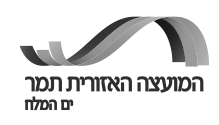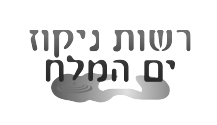Tomer & Giora Ron

Tomer – born on Kibbutz Ein Gedi, was a talented musician, philosopher, and keen runner. He worked in agriculture in the date orchard on the kibbutz that he loved so dearly, where he tragically lost his life when the crane on which he was standing turned over and killed him.
Tomer was born and raised on Kibbutz Ein Gedi, and was deeply connected with the kibbutz his entire life. He was the second-born to his parents, Ruti and Eli Ron, who were among the founders of the kibbutz. In his early years, Tomer was a slender child, full of mischief and a lover of life. Already in elementary school he wavered between two passions – playing the piano and long-distance running. As he matured, he underwent a significant change, from a jovial boy to a more reserved young man, quiet and serious, who excelled in his studies.
The death of his beloved and admired brother Giora, who was killed during the First Lebanon War, caused Tomer enormous grief just as he was entering the final stages of his matriculation exams from high school. Despite this terrible event, he still managed to pass all of his exams with surprising success.
Tomer was always fervently connected with his home and his family. So, when the difficult circumstances now cast him as the oldest sibling in the family, he was immediately imbued with a feeling of immense responsibility towards his parents and younger brothers, Erez and Ronen. Each day, until his last, he worried for the well-being of the entire family.
When he completed his studies, Tomer spent a year volunteering on the new Kibbutz Holit. The disconnection from his home was extremely difficult for him. He served his country in the Intelligence corps of the IDF, as a disguised soldier in civilian clothes.
After his discharge from the army, Tomer returned to work in the date orchard, as he had in his youth. This allowed him to enjoy the solitude of nature for many long hours, which greatly suited his personality. During his work – which he undertook with zeal, fulfilling the tasks of at least two or three regular workers – he spent much time on personal reflections, or joyfully listened to music.
Outside of work, he continually developed and invested time in his other pursuits. Running became a way of life; he was often seen running along the pathways of the kibbutz, and as a more mature runner he achieved remarkable triumphs. Tomer was also deeply interested in literature, and read many beautiful works, mostly translated. Jazz was another life passion; he acquired a rare collection of records and CDs and enriched his knowledge of the genre through reading professional works – making him one of Israel’s leading experts in Avant-guard jazz.
After a few years of work in the date orchard, Tomer turned his attention to studying philosophy at Tel Aviv University. He learned for the knowledge, not for a degree or certificate. He did not stand out during class, due to his great humility, but his papers were of a very high standard and he engendered a warm relationship with the staff.
When he graduated with honors, he returned to the date orchard, where he was tragically killed. His drive to achieve led him to forsake safety precautions, and the crane on which he stood overturned. In the blink of an eye his life was lost, at the age of 31.
The musical notes in his room fell silent.

Giora – a young man of grace and respect. A passionate runner his entire life, he was killed on the first day of battle of the First Lebanon War in 1982. Giora was the son of Ruti and Eli, who were among the founders of Kibbutz Ein Gedi, and was one of the first children born on the kibbutz.
In 1960, the year that Giora was born, Kibbutz Ein Gedi was still thought of as a commune on the other side of the world, far from clinics and hospitals. This caused his mother, as she neared her time to give birth, to make her way to Kiryat Haim, where Giora’s grandparents lived, and where Giora spent the first month of his life. The return home, which was too long and complicated to make by car, was undertaken in a Piper aircraft.
Giora grew and was educated amongst a small group of children, studying in his kibbutz home for nine years. Afterwards he completed his studies at the high school in Arad. After a long day at school and an exhausting ride home, he would change into his sports clothes and head out for a training run – day in, day out. As a student of distinction, he was chosen to represent his school on a youth visit hosted by the Jewish community in London.
With the completion of his studies, Giora spent a year volunteering in Kiryat Ekron, guiding the local youth. The year was formative in his personal development. New worlds opened up before him: painting, music, literature and philosophy – in addition to running, his daily bread. That year also revealed the beauty of friendship, and deep relationships were formed with his fellow volunteers. It was a period in which he flourished, but this was brought to an end in 1979 with his recruitment to the IDF.
Giora joined the Nachal Brigade and served as a paratrooper. Although army life stifled him, he was an outstanding soldier throughout his service. Nevertheless, he was continually aware that the army was separating him from more spiritual and cultural pursuits. Thus, during home visits, he would wake up early every morning, despite the deep exhaustion he suffered as a combat soldier, in order to enjoy what he loved most. “I can’t waste a Shabbat on sleep,” he would say.
In February 1980, Giora completed his parachute course, and that summer finished sergeant training. However, the chance to proceed to officer training caused him much consternation: he viewed it as immoral, and claimed that he didn’t have – and neither did anyone else – the right to order around or punish his fellow man. Consequently, when he was sent to officer school, he removed himself from the course.
Despite his distaste for military life, he was a beloved commander to his subordinates, and was even selected as a soldier of distinction. On Israel’s Independence Day in 1982, he was among the soldiers of distinction invited to the President’s Residence.
A few months before his longed-for discharge, the “Peace in the Galilee” (First Lebanon) War broke out, and on 7 June 1982, his company found itself sea-bound for the Lebanese coast. The company landed north of Sidon. As they passed by the village of Ras Nabi-Younus, they were fired upon from one of the homes, on the roof of which flew a white flag. Giora was wounded and killed. He was 22 years old.
And so the life that had just begun to flourish and blossom was brought to an untimely end.





















